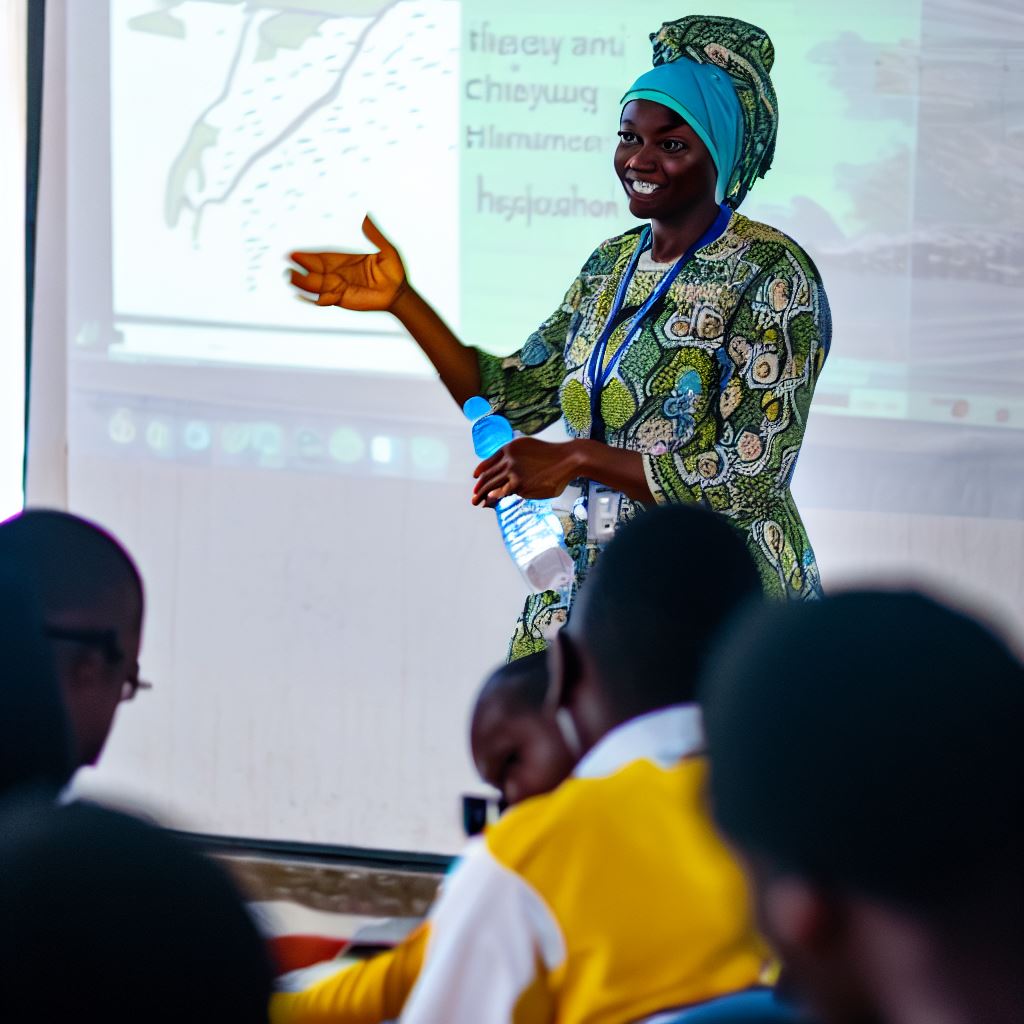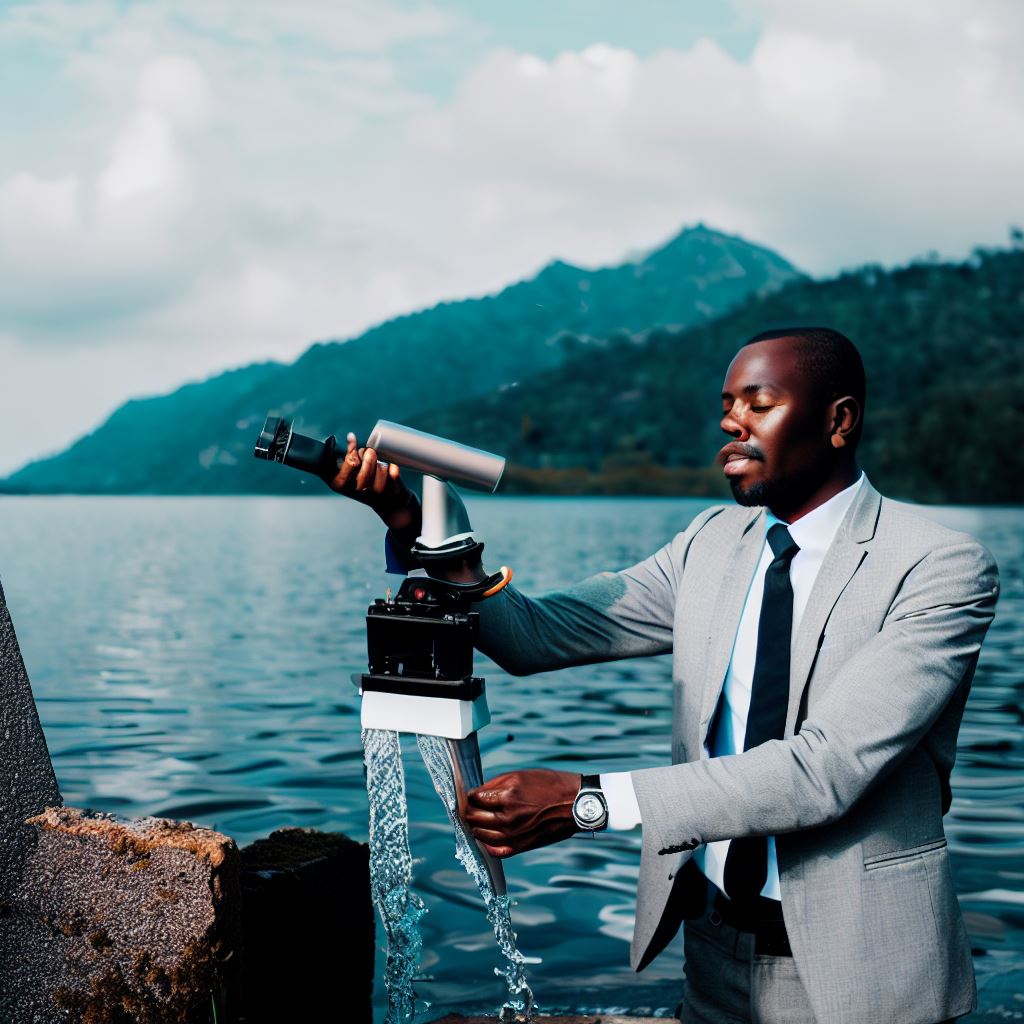Introduction
Women in hydrology in Nigeria’s field play a crucial role in water resource management and research.
Breaking barriers and promoting gender equality are essential for their empowerment and success.
Overview of Hydrology in Nigeria
Hydrology is a vital field that studies the distribution, movement, and quality of water on Earth.
In Nigeria, a country blessed with abundant water resources, hydrology plays a crucial role in various aspects of development and environmental management.
An overview of hydrology as a field
Firstly, hydrology is essential for understanding Nigeria’s water resources. It helps in assessing the availability, quantity, and quality of surface water and groundwater.
This information is vital for identifying potential sources of water for various purposes such as drinking, irrigation, industries, and hydropower generation.
Additionally, hydrology is crucial for managing water resources effectively.
Nigeria faces numerous water-related challenges, including floods, droughts, and contamination.
By studying hydrological patterns, experts can develop strategies to mitigate these issues.
They can design flood control measures, establish water storage systems, and implement water treatment initiatives to ensure safe and sustainable water supply.
Significance in Nigeria’s development and environmental management
Moreover, hydrology plays a significant role in environmental management.
The study of hydrological processes helps in understanding the impact of human activities on water resources and ecosystems.
By analyzing hydrological data, scientists can assess the health of rivers, lakes, and wetlands and identify potential pollution sources.
This information is crucial for developing strategies to protect and restore Nigeria’s valuable aquatic ecosystems.
Furthermore, hydrology contributes to sustainable development in Nigeria.
By understanding the availability and distribution of water resources, policymakers can make informed decisions.
They can plan infrastructure projects, such as dams and irrigation systems, to utilize water resources efficiently.
Hydrological studies also support sustainable agricultural practices, as farmers can optimize irrigation schedules based on rainfall patterns and water availability.
Additionally, hydrology plays a vital role in the energy sector.
Nigeria has significant hydropower potential, and hydrologists play a critical role in harnessing this renewable energy source.
By studying river flows and rainfall patterns, experts can estimate hydropower generation capacities and design efficient dams and turbines.
Another important aspect of hydrology is its role in disaster management.
Nigeria is prone to floods and droughts, which can have devastating consequences.
Hydrological studies help in predicting and monitoring these events, enabling early warning systems and evacuation plans to be implemented.
This preparedness can save lives and minimize the economic impact caused by natural disasters.
Lastly, hydrology is a crucial field in Nigeria’s development and environmental management.
By studying the distribution, movement, and quality of water resources, hydrologists provide valuable information for sustainable water management, environmental protection, and disaster prevention.
Nigeria’s abundant water resources make hydrology even more significant, as it enables the country to harness its potential for economic growth and energy production.
Therefore, investing in hydrological research and expertise is essential for breaking barriers and ensuring a better future for Nigeria.
Historical barriers faced by women in hydrology
The gender disparities and biases prevalent in Nigeria’s hydrology sector
In Nigeria’s hydrology sector, gender disparities and biases have long hindered the progress of women.
These barriers have impeded their pursuit of careers in hydrology, perpetuating inequality and limiting opportunities for women.
Examples of challenges faced by women in pursuing careers in hydrology
- Limited Access to Education: Women have historically faced limited access to quality education in hydrology, resulting in a lack of skills and knowledge necessary for career advancement.
- Societal Stereotypes: Deep-rooted stereotypes depict hydrology as a male-dominated field, discouraging women from entering or excelling in it.
- Lack of Female Role Models: The scarcity of female role models in hydrology makes it difficult for aspiring women to envision themselves succeeding in the field.
- Unsupportive Work Environment: Hostile work environments with prevalent sexism and discrimination create daunting challenges for women in hydrology.
- Family Responsibilities: Traditional gender roles and societal expectations often place a heavier burden on women, making it challenging for them to balance family obligations with demanding hydrology careers.
- Limited Networking Opportunities: Exclusion from male-dominated professional networks and associations limits women’s access to critical resources and opportunities for career growth.
- Lack of Recognition and Representation: Women’s achievements and contributions in hydrology are often overlooked, leading to disparities in acknowledgment and representation.
- Wage Gap: Gender-based wage gaps persist in the hydrology sector, with women earning less than their male counterparts for comparable work.
- Perceived Physical Limitations: Stereotypes regarding physical strength and endurance place additional hurdles for women in hydrology, discouraging their participation in fieldwork.
These barriers have created a significant gender imbalance in Nigeria’s hydrology sector, depriving the nation of diverse perspectives and stifling progress.
Breaking through these barriers requires a comprehensive approach
- Improving Access to Education: Ensuring equal access to hydrology education and training for women, promoting skill development, and encouraging female students to pursue careers in the field.
- Addressing Societal Stereotypes: Challenging and dismantling gender biases by promoting positive narratives and showcasing successful women in hydrology.
- Eliminating Gender Bias in Hiring: Implementing fair recruitment practices and fostering inclusive workplaces that value qualifications and skills over gender.
- Establishing Mentorship Programs: Creating mentorship opportunities to provide guidance and support for women in hydrology, helping them navigate the challenges and build successful careers.
- Promoting Work-Life Balance: Encouraging policies and practices that support work-life balance, making it easier for women to manage family responsibilities alongside their hydrology careers.
- Creating Networking Platforms: Establishing networks and platforms that connect women in hydrology, facilitating knowledge exchange, collaboration, and mentorship.
- Recognizing Achievements: Highlighting and celebrating the accomplishments of women in hydrology to inspire future generations and challenge gender biases.
- Ensuring Pay Equity: Taking proactive steps to eliminate gender-based wage gaps and promoting equal compensation for women in hydrology.
- Combatting Stereotypes: Educating society about the diverse roles and opportunities available in hydrology, breaking down stereotypes and encouraging women to explore the field.
- Creating Inclusive Policies: Advocating for and implementing policies that promote gender equality and inclusivity in the hydrology sector.
By addressing these barriers and implementing targeted strategies, Nigeria can embrace the full potential of women in hydrology.
Fostering innovation, diversifying perspectives, and creating a more equitable and inclusive sector.
Read: Education for Space Scientists in Nigeria: A Pathway
Breaking Barriers in Nigeria’s Hydrology Sector
Gender equality in the hydrology sector of Nigeria has made significant progress in recent years, breaking down barriers and empowering women.
Initiatives, policies, and organizations have played a crucial role in this positive change.
Progress towards Promoting Gender Equality in Hydrology
- Increased Participation: Women’s involvement in the field of hydrology has significantly increased in recent years.
- Equal Opportunities: Efforts have been made to provide equal opportunities for men and women in pursuing hydrology careers.
- Education and Awareness: Educational institutions and awareness programs have emerged, focusing on encouraging women to choose hydrology as a career path.
- Women in Leadership Roles: More women are now occupying leadership positions in hydrology organizations, breaking traditional gender norms.
- Research and Development: Women researchers have excelled in hydrology, contributing their expertise to scientific advancements.
Initiatives, Policies, and Organizations Promoting Female Empowerment
- Women in Hydrology Association (WHA): WHA was established to support and empower women in the hydrology field, providing networking and professional development opportunities.
- Gender-Inclusive Policies: The government has implemented policies promoting gender equality, ensuring equal opportunities for women in hydrology.
- Scholarships and Grants: Various organizations offer scholarships and grants exclusively for women pursuing hydrology studies, encouraging their active participation.
- Mentoring Programs: Mentorship initiatives have been introduced to guide and support young women interested in hydrology careers.
- Workshops and Conferences: Regular workshops and conferences are organized to discuss gender-related issues and share success stories of women in the field.
The impact of these initiatives, policies, and organizations is evident in the increased number of women actively participating in hydrology and breaking gender barriers.
By breaking these barriers, women have brought diverse perspectives and innovative ideas to the hydrology sector, ultimately benefiting society and the environment.
Their contributions have resulted in improved water management practices, sustainable development, and an inclusive hydrological approach.
However, despite the progress, challenges persist. Gender stereotypes and biases continue to hinder equal opportunities for women in the hydrology sector.
To overcome these challenges, continuous efforts are required to promote gender equality, change cultural norms, and support women in pursuing hydrology careers.
Nigeria’s hydrology sector has made significant strides in promoting gender equality and empowering women.
The progress can be attributed to various initiatives, policies, and organizations that support women’s participation and leadership in hydrology.
However, more work needs to be done to fully eliminate gender barriers and ensure equal opportunities for all in this field.
Read: The Role of Cartography in Nigeria’s Urban Planning
Success stories of women in Nigerian hydrology
In Nigeria, where gender disparities are still prevalent, women in hydrology have been defying norms and excelling in their field.
Despite facing numerous challenges, these women have made significant contributions and achieved remarkable success.
Their stories serve as an inspiration to other women aspiring to enter the field of hydrology.
Inspiring stories of women who have excelled in the field of hydrology
- Dr. Aisha Abdullahi: Dr. Abdullahi is a renowned hydrologist who has been instrumental in improving water management in Nigeria. Her research and expertise have paved the way for sustainable development in the country.
- Engr. Funke Akindele: As a hydrological engineer, Engr. Akindele has played a crucial role in implementing effective flood control measures across Nigeria. Her innovative solutions have helped save lives and protect infrastructure.
- Prof. Ngozi Okonjo-Iweala: While not directly working in hydrology, Prof. Okonjo-Iweala’s leadership as Nigeria’s first female Minister of Finance has had a significant impact on water resource management. She championed important policies and advocated for gender equality in the field.
- Dr. Tayo Adeoye: Dr. Adeoye is a prominent hydrologist known for her groundbreaking research on water quality and pollution control. Her findings have influenced government policies and helped preserve Nigeria’s water resources.
- Engr. Maryam Ibrahim: Engr. Ibrahim has made remarkable contributions to watershed management and irrigation systems in Nigeria. Her innovative techniques have increased agricultural productivity and improved livelihoods in rural communities.
Their contributions and achievements
These women have not only excelled in their respective hydrology careers but have also inspired others through their achievements.
They have demonstrated that gender should not be a barrier to success and that women can thrive in traditionally male-dominated fields.
The contributions of these women in hydrology cannot be underestimated.
Their expertise and dedication have led to the development and implementation of sustainable water management practices in Nigeria.
They have facilitated access to clean water, reduced the impact of flooding, and protected the environment.
However, their journey has not been without challenges. Women in hydrology often face gender biases, limited opportunities, and stereotypes that question their capabilities in a male-dominated field.
Despite these obstacles, these exceptional women have persevered, breaking down barriers and forging a path for others to follow.
The achievements of these women go beyond their individual success; they have paved the way for a more inclusive and diverse hydrology industry in Nigeria.
Their accomplishments inspire young girls to dream big and pursue careers in STEM fields, encouraging a generation of future female hydrologists.
The success stories of women in Nigerian hydrology serve as an inspiration to all.
They highlight the immense contributions and achievements of women in a field that has often been dominated by men.
These women have proven that talent, dedication, and determination can defy societal barriers and lead to exceptional success.
Their stories will continue to motivate and encourage women to break stereotypes and pursue their passions in hydrology.
Read: Atmospheric Research Centers in Nigeria: A Tour

Role of education and mentorship
The role of education and mentorship in empowering women in hydrology is crucial.
Education provides women with the necessary knowledge and skills to excel in the field.
It equips them with a scientific background and the technical expertise required for hydrological research and analysis.
Additionally, education instills confidence in women, allowing them to actively participate and contribute in a male-dominated field.
Mentorship plays a vital role in shaping the career paths of women in hydrology.
Having a mentor helps women navigate the challenges and obstacles they may face.
Mentors provide guidance, support, and valuable insights based on their own experiences.
They help bridge the gap between theory and practice, fostering professional development and growth.
Furthermore, mentorship creates a sense of belonging and encourages networking within the hydrology community.
The importance of education and mentorship in empowering women in hydrology
In the field of hydrology, education is a powerful catalyst for women, enabling them to break barriers.
Knowledge opens doors, paving the way for meaningful contributions to the field. Mentorship complements education, offering guidance and support.
Education equips women with the skills and knowledge needed to excel in hydrology’s diverse domains. It instills confidence, fostering their ability to tackle complex water-related challenges.
Through education, women can actively participate in research, policy-making, and practical applications, making a substantial impact.
Mentorship plays a pivotal role in nurturing talent and fostering professional growth.
Seasoned hydrologists mentor aspiring women, providing valuable insights and real-world perspectives.
These mentors empower their mentees to navigate the field’s nuances, helping them build networks and gain confidence.
Together, education and mentorship create a dynamic synergy, strengthening the presence and influence of women in hydrology.
They bridge the gender gap, ensuring that women are well-prepared and empowered to drive advancements in this critical field.
Programs or initiatives that provide educational opportunities and support for women in the field
Several programs and initiatives have been introduced to provide educational opportunities and support for women in hydrology.
The International Association of Hydrological Sciences (IAHS) offers scholarships and grants specifically for women pursuing hydrological studies.
These financial aids help alleviate the financial burden and make education more accessible.
The Young Hydrologic Society (YHS) focuses on mentorship programs.
They connect young hydrologists with experienced professionals, facilitating knowledge transfer and career guidance.
YHS also organizes workshops and conferences, creating a platform for women to showcase their research and share experiences.
The African Network of Young Water Professionals (ANYWP) supports young women in hydrology through capacity building programs.
These programs enhance technical skills and provide training on research methodologies and data analysis.
ANYWP promotes collaboration and networking among women in hydrology through workshops and online forums.
Additionally, they organize career fairs and job placement opportunities, supporting women in securing employment in the field.
Publish Your Professional Profile, Business or Brand
Showcase your expertise, gain trust, and boost visibility instantly on Professions.ng.
Publish NowWomen in Water, Environment and Development Organization (WWEDO), based in Nigeria, provides mentorship and leadership programs specifically for women in hydrology.
They aim to empower women through mentorship, training, and advocacy, promoting gender equality in the field.
WWEDO also conducts awareness campaigns and outreach programs, inspiring young girls to pursue careers in hydrology.
Education and mentorship are instrumental in empowering women in hydrology.
These two factors provide the necessary knowledge, skills, support, and guidance for women to excel in the field.
Through various programs and initiatives, women are provided with educational opportunities, scholarships, mentorship, and networking platforms.
These efforts contribute to breaking barriers and increasing the representation of women in hydrology, ultimately leading to a more diverse and inclusive field.
Read: Space Technology in Nigeria: A Scientists’ Overview
Challenges and Opportunities for Women in Hydrology: Breaking Barriers in Nigeria’s Field
Remaining Challenges for Women in Nigeria’s Hydrology Field
- Limited access to education and training opportunities in hydrology, creating a gender gap in technical skills.
- Gender bias and stereotypes that discourage women from pursuing careers in hydrology.
- Lack of support networks and mentorship opportunities for women in the field.
- Unequal career advancement opportunities due to a male-dominated work environment.
- Balancing family responsibilities with demanding fieldwork and travel requirements.
- Limited representation and inclusion of women in decision-making processes and leadership sitions.
- Inadequate recognition and appreciation of women’s contributions to the hydrology field.
Potential Opportunities for Breaking Barriers and Promoting Gender Equality
- Gender-responsive and inclusive policies and regulations that address the specific challenges faced by women in hydrology.
- Increasing access to quality education and training programs for women to enhance their technical skills.
- Creating awareness and advocacy campaigns to challenge gender stereotypes and promote equal opportunities in hydrology.
- Establishing mentorship programs and support networks to provide guidance and empower women in the field.
- Implementing flexible work arrangements and policies that accommodate the needs of women with family responsibilities.
- Encouraging and engaging women in decision-making processes to ensure diverse perspectives in the field.
- Recognizing and celebrating the contributions and achievements of women in hydrology through awards and acknowledgments.
While women in hydrology in Nigeria continue to face various challenges, there are also opportunities for breaking barriers and promoting gender equality in the field.
By addressing the remaining challenges and implementing the potential opportunities mentioned above, women can actively participate.
Contribute, and thrive in hydrology, ultimately leading to a more diverse and inclusive sector.
You Might Also Like: Optical Tech Role in Nigeria’s Healthcare System
Conclusion
Importance of breaking barriers for women in hydrology in Nigeria
Women in hydrology in Nigeria are breaking barriers, reshaping the field, and inspiring change nationwide.
They bring fresh perspectives, innovative solutions, and valuable skills to address water challenges.
By actively participating in hydrology, women contribute to sustainable water management and environmental conservation.
Their involvement ensures diverse voices are heard, fostering holistic approaches to water-related issues.
Encourage continued efforts towards achieving gender equality in the field
Gender equality in the field is vital, we must promote diversity and inclusivity actively. Encouraging women’s participation sparks innovation.
Breaking down barriers is essential,d adressing biases, both conscious and unconscious, is crucial, Equal opportunities drive progress.
Empowerment through education matters, Encouraging girls to pursue STEM fields fosters talent, scholarships and mentorship programs are effective tools.
Companies should prioritize diversity,inclusive workplaces benefit everyone, gender-balanced teams produce better results. It’s a win-win situation.
In the ever-evolving field of hydrology, women are breaking barriers and shattering stereotypes.
They’re making remarkable strides, contributing their unique perspectives, and driving innovation.
More women are pursuing hydrology careers, advocating for gender equality, and encouraging diversity in the field.
They inspire the next generation with their determination and passion.
Research shows that diverse teams excel in problem-solving and innovation, which bodes well for the future of hydrology.
Women bring fresh ideas and diverse experiences to the table.




